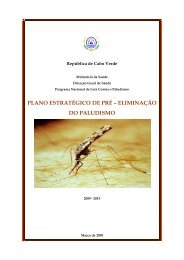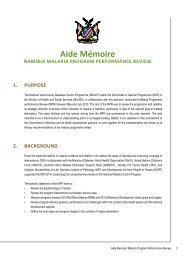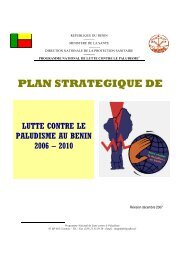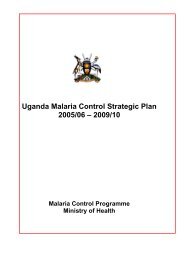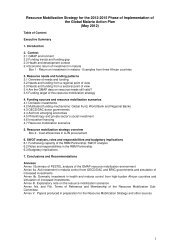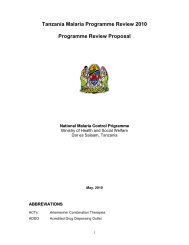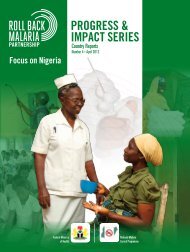Progress & ImPact serIes - Roll Back Malaria - World Health ...
Progress & ImPact serIes - Roll Back Malaria - World Health ...
Progress & ImPact serIes - Roll Back Malaria - World Health ...
You also want an ePaper? Increase the reach of your titles
YUMPU automatically turns print PDFs into web optimized ePapers that Google loves.
increasingly confined to border areas—and where<br />
cross-border migration represents a major source<br />
of new malaria infection—regional cooperation is<br />
also critical for the development of cross-border<br />
strategies that are inclusive of marginalized<br />
populations.<br />
Governments have already made a number of<br />
commitments in the uN General Assembly and<br />
the <strong>World</strong> <strong>Health</strong> Assembly, through the governing<br />
bodies of WHO regional structures, b and through a<br />
range of regional cooperation platforms, such as<br />
the union of South American Nations (uNASuR)<br />
and the Association of Southeast Asian Nations<br />
(ASEAN). However, stronger political commitment<br />
will be needed to provide universal access to all<br />
key malaria interventions and to move closer to<br />
malaria elimination. With malaria designated as one<br />
of the key priorities of the uN Secretary General’s<br />
five-year action agenda (2012–2017), there is an<br />
unprecedented opportunity to end the unnecessary<br />
suffering caused by this disease.<br />
5. What can be gained?<br />
• The burden of a senseless, preventable tragedy<br />
can be lifted. Scaling up malaria control efforts<br />
has been proven to reduce illness and death,<br />
especially among the poorest populations<br />
outside of Africa. This relieves some of the<br />
most vulnerable populations of a significant<br />
illness that causes disruption to schooling,<br />
work, and, at the worst, death.<br />
• Considerable long-term impact and financial<br />
savings can be achieved both in endemic<br />
countries and globally. Protecting the tools<br />
we have by working to contain emerging<br />
drug and insecticide resistance will have<br />
cost implications in the near term for which<br />
many malaria-endemic countries will need<br />
support. However, investment now will result<br />
in significant savings in the long run, improving<br />
the sustainability and public health impact of<br />
malaria interventions, not only in countries<br />
affected but globally.<br />
• <strong>Health</strong> systems can be strengthened.<br />
Improving the malaria response—at both the<br />
national level and in larger regions—will boost<br />
the capacities of health systems to improve<br />
the treatment of other febrile illnesses and<br />
will help to direct financial resources where<br />
the funds are most needed. Strengthening<br />
health infrastructure and improving health<br />
information systems for malaria will strengthen<br />
countries’ overall capacities to respond to<br />
future public health threats, while also helping<br />
bridge existing health inequalities.<br />
• Large areas of the world can be free of malaria<br />
in the foreseeable future. Four countries<br />
outside of Africa have been certified free<br />
of malaria since 2007. Another 17 are in the<br />
pre-elimination or elimination stage of malaria<br />
control and poised to eliminate malaria soon—<br />
removing the threat of disease from 74 million<br />
people currently at risk. If elimination is<br />
attained in these countries it would represent<br />
a historic achievement to be remembered<br />
for decades to come and set the course for<br />
eventual eradication of this ancient disease.<br />
b See, for instance, the Regional Action Plan for <strong>Malaria</strong> Control and Elimination in the Western Pacific (2010–2015), which was<br />
endorsed by the 60th Regional Committee of the WHO Western Pacific Region in 2009.<br />
DEFEATING MALARIA IN ASIA, THE PACIFIC, AMERICAS, MIDDLE EAST AND EuROPE<br />
15




